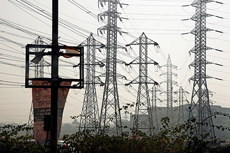News
 Although Nepal has a significant hydropower potential of about 43,000 mega watts, its installed generation capacity is less than 700 mega watts. As a result, Nepal has extremely low access to electricity and disruptive power cuts lasting up to 16 hours a day. The country is expanding its power sector investments to include cross – border energy trade with India with support from the World Bank.
Although Nepal has a significant hydropower potential of about 43,000 mega watts, its installed generation capacity is less than 700 mega watts. As a result, Nepal has extremely low access to electricity and disruptive power cuts lasting up to 16 hours a day. The country is expanding its power sector investments to include cross – border energy trade with India with support from the World Bank.
Since reliable supply of electricity is fundamental to sustained economic growth and human development, the World Bank is supporting the country’s electricity sector to invest in new and existing power generation assets to increase access to electricity. The Bank is also playing an important role in facilitating cross-border energy trade to allow Nepal to import power from India to resolve its crippling load-shedding. In turn, this trade will allow for the export of expected future surplus power capacity in Nepal as large hydro generation projects come on-line. At present, several large, export-oriented generation projects are under development in Nepal.
To this end the World Bank, with ESMAP's support, convened a workshop for Nepal’s energy sector professionals to discuss issues associated with inter-country power markets in South Asia such as regulatory, legal, technical and economic issues. The sessions focused on: defining electricity markets, discussing trade strategies, analyzing India’s power markets and its regulatory framework, and sharing global experience on regional integration in power markets.
An overview of India’s energy sector was presented to participants, its move towards energy markets and market driven pricing, India’s government initiatives to augment supply along with private sector, as well as its increased awareness of environmental issues. Similarly, challenges faced by India’s energy sector were shared including levels of investment required, adequacy and stability of policies and regulations, and the lack of an enabling environment for implementing policy reforms.
Essentials for a competitive electricity market were outlined as a necessity for cross border energy trade. Electricity market essentials include having:
• Several buyers and sellers
• Demand and supply responsiveness to price
• Equal access to essential facilities like transmission and distribution
• Liquid and efficient marketplaces, multi-buyer multi-seller model
• Open Access both at utility level and consumer level
• Competitive procurement for medium-term and long-term power
• Development of a vibrant trading platform
Finally, benefits of integrated regional markets between Sri Lanka, India, Nepal, Bhutan, Bangladesh, Pakistan, and Bhutan, were enumerated as follows:
Economic Benefits
• Countries with rich energy resources would be able to supply large economies.
• Large and more efficient generation capacity
• Load shapes and time differences can be effectively utilized– India has a flatter and more flexible demand curve than neighbors
• Countries with intermittent power resources would be supported such as Sri Lanka
• Interconnections would be cheaper
• Hydro dominated nations (particularly Nepal) would gain from thermal power in lean seasons and peak hours
• The markets would help utilize the power when the economic value is the highest
The workshop was attended by senior management of the Ministry of Energy, Nepal’s national electricity authority, hydropower developers from the private sector, and commercial banks interested in lending to hydropower investments. The workshop was held on February 14 - 15, 2011, in Kathmandu and was sponsored by the Energy Sector Management Assistance Program (ESMAP).
Cross border energy trade and increased investments in the power sector will offer clean, safe and reliable electricity to millions of South Asians currently living without electricity, leading to improved lives and sustained economic growth.
Workshop Presentations of "Power Markets and Trade in South Asia: Opportunities for Nepal"
are available below:
Related Website: The World Bank's Nepal Country Website
